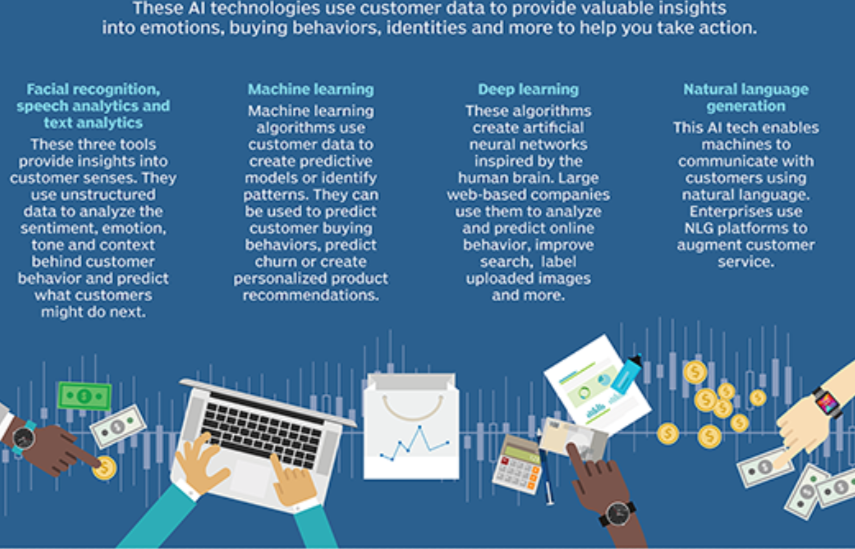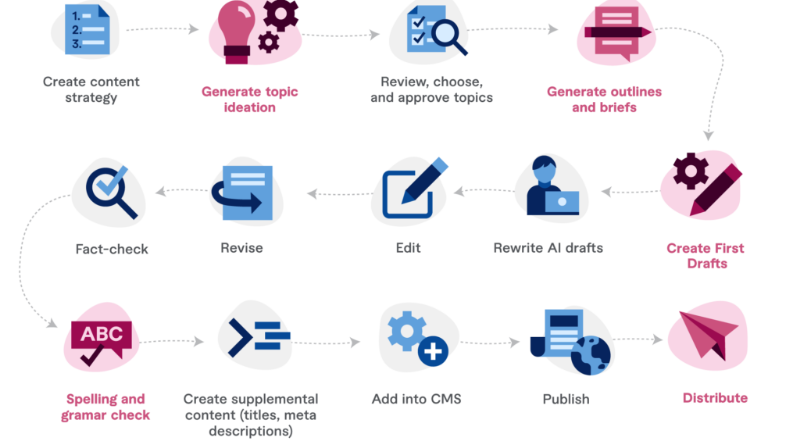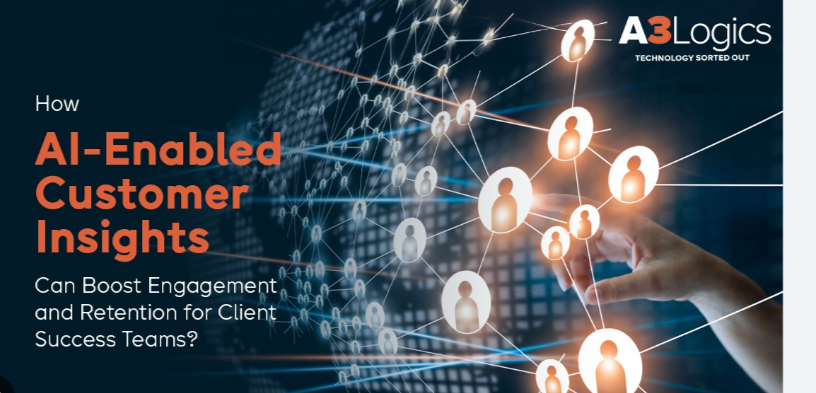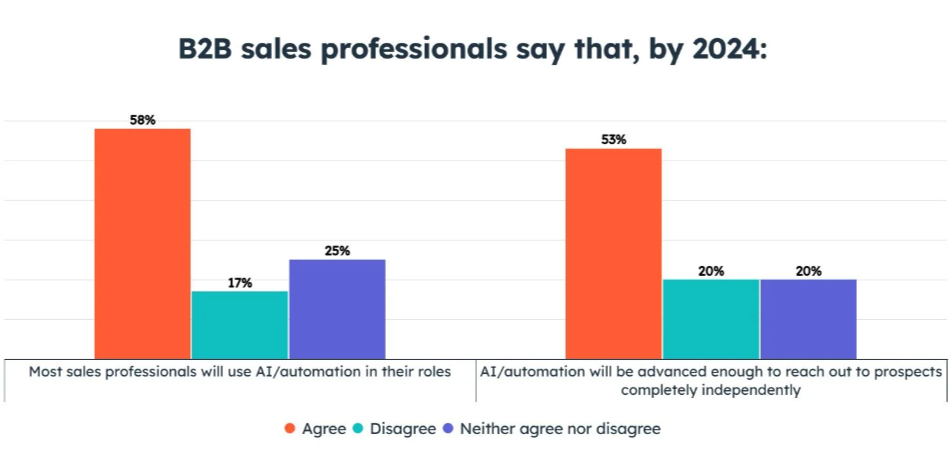As the business landscape evolves, the role of AI in B2B marketing becomes increasingly crucial. AI’s advanced capabilities enable you to analyze data more deeply, predict customer behavior, and personalize your marketing strategies more effectively.
If you want to harness AI’s full potential in B2B marketing, Flying V Group offers expert services to integrate these technologies into your marketing efforts. We design comprehensive strategies that leverage AI and deliver true ROI.
Dive into AI with Flying V Group and transform how you connect with your B2B audience, making your marketing smarter and more efficient.
- Understanding AI’s Role in B2B Marketing
- Enhancing Customer Insights with AI
- AI-Driven Content Strategy
- AI in Account-Based Marketing (ABM)
- Customer Engagement and Retention
- Measuring and Optimizing with AI
- Overcoming Challenges in AI Adoption
- The Future of AI in B2B Marketing
- Unlock Competitive Advantage With B2B Marketing
- FAQs
Understanding AI’s Role in B2B Marketing
In B2B marketing, Artificial Intelligence (AI) is a powerful tool that automates and enhances the complex processes of understanding and engaging business customers. AI leverages machine learning, data analysis, and automated decision-making to optimize your marketing strategies, ensuring they are both efficient and effective.
The key differences between B2B and B2C marketing primarily lie in the length of the sales cycles, the complexity of transactions, and the nature of customer relationships.
B2B transactions typically involve longer decision-making processes and higher stakes, requiring a deep understanding of business needs and a tailored approach. This is where AI steps in; it helps you navigate these complexities by enabling deeper data-driven insights and fostering personalized customer engagements.
AI enhances customer insights in B2B marketing by:
- Analyzing large data sets to identify patterns and trends that human analysts might miss.
- Predicting customer needs by analyzing past interactions and behaviors.
- Segmenting customers more accurately allows for more targeted and effective marketing campaigns.
Enhancing Customer Insights with AI
In B2B marketing, AI tools transform how you gather and analyze customer data, offering a deeper, more nuanced understanding of your business clientele. These tools use advanced algorithms to sift through large datasets, identifying patterns and insights that can drive strategic decisions.

AI technologies such as machine learning models are adept at processing both structured data (like sales figures or website traffic) and unstructured data (like email interactions or social media posts).
This comprehensive analysis helps you pinpoint your customers’ behaviors, preferences, and pain points, enabling tailored marketing strategies that resonate more effectively with target audiences.
Additionally, this insight helped streamline product development to focus on popular features, enhancing overall product value.
AI-Driven Content Strategy
AI-driven content strategies can dramatically enhance your engagement with business clients. AI streamlines the content creation process and ensures that it is highly tailored to meet the specific needs of your B2B audience.
AI tools are invaluable in creating content that resonates with a professional audience. These tools utilize natural language processing (NLP) to generate informative and relevant articles, reports, and whitepapers that adhere to the sophisticated tone and complexity required in B2B communications.

Additionally, AI can help generate data-driven blog posts that align closely with emerging trends and industry insights, providing your audience with valuable information that underscores your expertise and thought leadership.
Beyond content creation, AI excels in content management and optimization. Tools like Curata and Scoop.it help you curate and share pertinent content, keeping your brand at the forefront of industry discussions.
This saves valuable resources and enhances the effectiveness of your marketing efforts, making AI an indispensable tool in your B2B marketing arsenal.
AI in Account-Based Marketing (ABM)
Account-based marketing (ABM) is a strategy where you tailor your marketing efforts to individual key accounts, treating each as a market of one. AI supercharges ABM by enhancing precision and efficiency, allowing you to engage with your most valuable accounts effectively.
Application of AI in ABM:
Data Aggregation and Analysis: AI collects and analyzes data across multiple channels, providing a 360-degree view of each target account. This includes engagement history, decision-maker behaviors, and company needs.
Predictive Analytics: AI utilizes historical data to predict future buying behaviors and preferences of key accounts, helping you to tailor your approaches accurately.
Benefits of AI in Targeting Key Accounts:
Personalized Communication: AI helps craft messages and content that resonate deeply with each account based on data-driven insights into their needs and pain points.
Efficient Resource Allocation: AI identifies the most promising accounts, ensuring you allocate resources more effectively and maximize ROI.
Scalability: Automates repetitive tasks and scales your ABM efforts without additional resource investment, allowing you to cover more accounts with personalized strategies.
Customer Engagement and Retention
Enhancing Customer Interactions:
Chatbots: AI-powered chatbots respond immediately to customer inquiries, offering support and resolving issues around the clock. This improves response times and enhances customer satisfaction by providing a seamless interaction experience.

Personalized Communications: AI analyzes customer data to tailor communications effectively. Understanding past interactions, purchase history, and content preferences allows you to customize messages that speak directly to the client’s needs and interests.
Strategies for Using AI to Increase Retention:
Predictive Customer Insights: AI tools predict customer needs by analyzing behavioral data. This anticipates problems and opportunities, allowing you to address issues before they become deal-breakers proactively.
Automated Engagement Programs: Use AI to automate follow-up emails, personalized offers, and content delivery that keeps your brand top-of-mind.
Measuring and Optimizing with AI
In B2B marketing, measuring and optimizing campaign performance is crucial to your success, and AI is the game-changer that can elevate your strategies to new heights.
AI tools effectively track campaign performance and customer engagement and analyze the data to provide actionable insights to enhance marketing efforts drastically.
With AI, you can access sophisticated analytics tools that delve into customer behavior, campaign outreach, and engagement metrics. These tools go beyond traditional analytics by reporting data and interpreting it.
AI can pinpoint patterns and trends that might not be visible to the human eye, such as subtle shifts in customer preferences or engagement dips at specific touchpoints. This level of analysis allows you to understand the ‘why’ behind the numbers, providing deeper insights into what is working and what isn’t.
Moreover, AI-powered platforms offer recommendations for optimization, taking the guesswork out of your strategy adjustments. They can suggest the best times to post on social media, the most effective content types for your audience, or adjustments to your email marketing strategies.
Overcoming Challenges in AI Adoption
1. Technical Challenges:
The technical integration of AI can be daunting. It requires a robust IT infrastructure and access to relevant data. Often, data silos within organizations hinder the effective training of AI systems, which rely on comprehensive, clean, and consistent data sets to function optimally.
Additionally, given the sensitivity of the data involved, ensuring that your AI systems are secure against cyber threats is crucial.
Organizational Hurdles:
Resistance to change is a common challenge in many organizations. Introducing AI-driven processes can disrupt established workflows, causing uncertainty among staff.
This can be mitigated by fostering an inclusive culture that values innovation and ongoing education. Training and development programs can help demystify AI for your team, highlighting its benefits and smoothing the transition.
Best Practices for Integration:
Start Small: Implement AI in phases. Begin with automating simpler tasks and gradually move to more complex applications as your comfort with the technology grows.
Choose the Right Tools: Select AI tools that integrate well with your existing marketing platforms and CRM systems, ensuring data flows seamlessly across all tools.
Focus on Data Quality: Invest in data management practices that enhance the quality and accessibility of your data.
Measure and Adjust: Continuously monitor the performance of AI implementations and be ready to tweak strategies as needed.
The Future of AI in B2B Marketing
The future of AI in B2B marketing looks incredibly promising, with emerging technologies poised to revolutionize how you engage with and understand your business clients.
Advances in AI, particularly in machine learning and natural language processing, will continue to refine the precision of customer insights, enabling even more personalized marketing strategies.

Imagine AI tools that predict customer needs and autonomously adjust real-time marketing messages to match each interaction’s context.wr
Furthermore, as AI becomes more integrated with Internet of Things (IoT) devices, the potential for hyper-targeted content delivery and real-time customer feedback will reshape B2B engagement strategies.
Unlock Competitive Advantage With B2B Marketing
Leveraging AI in B2B marketing offers transformative benefits, from deepening customer insights to optimizing content delivery and enhancing engagement. Integrating AI into your marketing strategies can provide a significant edge as you seek to stay competitive in a fast-evolving marketplace.
If you’re ready to harness the power of AI in B2B marketing, consider partnering with Flying V Group. Our expertise in crafting comprehensive marketing strategies incorporating AI will ensure you meet and exceed your business objectives, delivering true ROI. Leap into AI-enhanced marketing today and watch your business thrive.
FAQs
1. What is AI in B2B marketing?
AI in B2B marketing refers to using artificial intelligence technologies to analyze data, predict trends, personalize communications, and optimize marketing strategies to meet the needs of business clients better and enhance operational efficiency.
2. How does AI improve customer insights in B2B marketing?
AI analyzes vast amounts of data to uncover deep insights about customer behaviors and preferences, enabling marketers to create highly targeted campaigns that resonate with specific business audiences and improve engagement rates.
3. Can AI in B2B marketing improve lead generation?
Yes, AI significantly enhances lead generation by identifying potential leads through predictive analytics, scoring them based on their likelihood to convert, and automating personalized follow-ups, thereby increasing the efficiency and effectiveness of lead generation efforts.
4. What role does AI play in content strategy for B2B marketing?
AI assists in creating and managing content by analyzing user engagement and preferences, suggesting content topics likely to perform well, and optimizing content for SEO, making it more likely to reach and resonate with the intended audience.
5. Are there challenges to adopting AI in B2B marketing?
Implementing AI in B2B marketing can present challenges, including the need for significant data input, potential resistance to change within organizations, and the necessity for ongoing training and investment in technology. However, these challenges can be mitigated with strategic planning and commitment.






0 Comments